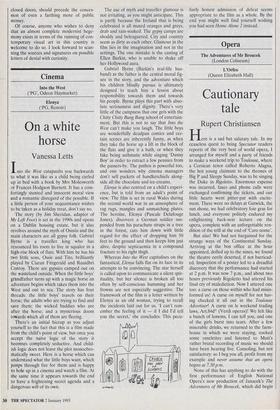Cinema
Into the West ('PG', Odeon Haymarket) Elenya ('PG, Renoir)
On a white horse
Vanessa Letts
Into the West catapaults you backwards to what it was like as a child being curled up in bed with a book by Mrs Molesworth or Frances Hodgson Burnett. It has a com- fortingly stunted and innocent moral view and a romantic disregard of the possible. If a little person of your acquaintance wishes to be taken as a holiday treat, don't say no.
The story (by Jim Sheridan, adapter of My Left Foot) is set in the 1990s and opens on a Dublin housing estate, but it also revolves around the myth of Osinin and the main characters are all gypsy folk. Gabriel Byrne is a traveller king who has renounced his roots to live in squalor in a high-rise block of flats. With him he has his two little sons, Ossie and Tito, brilliantly played by Ciaran Fitzgerald and Ruaidhri Conroy. There are gypsies camped out on the wasteland outside. When the little boys' grandfather turns up with a magic horse an adventure begins which takes them into the West and out to sea. The story has four threads: the little boys' travels on their horse; the adults who are trying to find and save them; the wicked baddies who are after the horse; and a mysterious doom towards which all of them are fleeing.
There's an initial hiccup as you adjust yourself to the fact that this is a film made from the child's point of view, but once you accept the naive logic of the story it becomes completely seductive. And child- ish logic does not leave the plot monochro- matically sweet. Here is a horse which can understand what the little boys want, which jumps through fire for them and is happy to hole up in a cinema and watch a film. At the same time it appears towards the end to have a frightening secret agenda and a dangerous will of its own.
The use of myth and traveller glamour is not irritating, as you might anticipate. This is partly because the Ireland that is being celebrated is all muted oranges and greys, drab and rain-soaked. The gypsy camps are shoddy and beleaguered. City and country seem as dirty as each other. Glamour in the film lies in the imagination and not in the settings. The one mistake is the casting of Ellen Barkin, who is unable to shake off her Hollywood aura.
Gabriel Byrne (Barkin's real-life hus- band) as the father is the central moral fig- ure in the story, and the adventure which his children blindly pursue is ultimately designed to teach him a lesson about responsibility towards them and towards his people. Byrne plays this part with abso- lute seriousness and dignity. There's very little of the campness that one gets with the Chitty Chitty Bang Bang school of entertain- ment. But this is not to say that Into the West can't make you laugh. The little boys are wonderfully deadpan comics and cer- tain scenes are inherently funny, as when they take the horse up a lift in the block of the flats and give it a bath, or when they fake being asthmatic while singing 'Danny Boy' in order to extract a few pennies from the passers-by. The pathos is powerful too, and one wonders why cinema managers don't sell packets of handkerchiefs along- side all the chocolate and ice-creams.
Elenya is also centred on a child's experi- ence, but is told from an adult's point of view. The film is set in rural Wales during the second world war in an atmosphere of rag rugs, mangles and unmatching plates. The heroine, Elenya (Pascale Delafouge Jones), discovers a German soldier sus- pended from his parachute straps in a tree in the forest, cuts him down with little regard for the effect of dropping him 50 feet to the ground and then keeps him just alive, despite septicaemia in a compound fracture to his right thigh.
Whereas Into the West capitalises on the fantastical, Elenya falls flat on its face in its attempts to be convincing. The star herself is called upon to communicate a silent spir- ituality, but her silence is broken all too often by self-conscious humming and her frowns are not especially suggestive. The framework of the film is a letter written by Elenya as an old woman, trying to recall the incidents laid out for us. 'I can't rem- ember the feeling of it — if I did I'd tell you the secret,' she concludes. This pecu- liarly honest admission of defeat seems appropriate to the film as a whole. By the end you might well find yourself wishing you had seen Home Alone 2 instead.










































 Previous page
Previous page